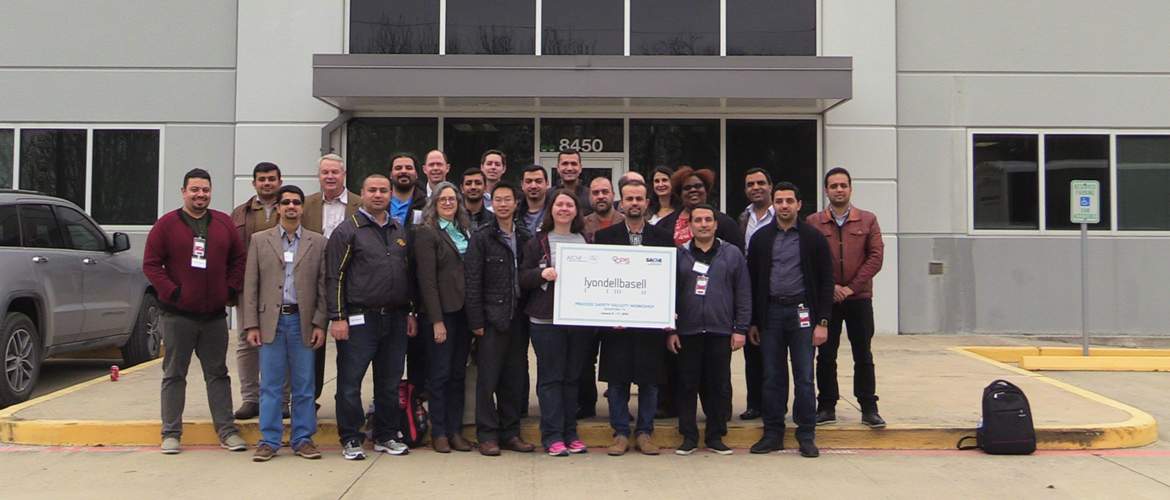
Two CEAT Professors Attend Industry-Led Workshop to Learn Process Safety Best Practices
Friday, January 12, 2018
LyondellBasell (NYSE: LYB), one of world’s largest plastics, chemicals and refining companies, along with the American Institute of Chemical Engineers (AIChE), teamed up to teach college professors about process safety best practices so they can in turn better prepare their students for entering the chemical and refining industries.
Oklahoma State University College of Engineering, Architecture and Technology faculty members Dr. Ashlee N. Ford Versypt, Assistant Professor of Chemical Engineering, and Dr. Qingsheng Wang, Associate Professor of Fire Protection & Safety Engineering Technology, attended the January 9-11 workshop at LyondellBasell’s Houston Engineering Center as part of AIChE’s Undergraduate Process Safety Learning Initiative, a multi-pronged global program that will define how the next generation of chemical engineers are prepared to enter the workforce. These industry-led classes provide professors the tools and information they need to incorporate safety training into their curriculum to ensure students graduate with a working knowledge of chemical process safety.
More than 20 engineering professors from colleges and universities across the U.S. and Iraq attended the workshop to learn how process safety is put into industrial practice and the importance of process safety to the design and operation of chemical and refining plants. LyondellBasell safety experts led the workshop and reviewed safety best practices and industry case studies with the faculty members. Additionally, visiting professors toured LyondellBasell manufacturing sites to see how process safety solutions are implemented in real life so that these practices can be shared in the classroom.
Last year, LyondellBasell announced a donation of $750,000 to the AIChE Foundation to support the organization’s Undergraduate Process Safety Learning Initiative. Dan Coombs, LyondellBasell’s executive vice president of Global Manufacturing, Projects, Refining and Technology and member of the AIChE Foundation Board of Trustees Corporate Council, reflected on the benefits of the initiative stating, “At LyondellBasell, we work every day to be the best operated company in the industry and that requires an unwavering commitment to safety. The AIChE Foundation’s Undergraduate Process Safety Learning Initiative provides the opportunity for our safety experts to actively engage in better preparing faculty members and developing curriculum that will give the next generation of chemical engineers a foundation of excellence in process safety.”
On behalf of AIChE, Executive Director June Wispelwey expressed her appreciation to LyondellBasell for its generosity and commitment to promoting process safety within the chemical engineering industry. “AIChE and our Center for Chemical Process Safety are grateful for LyondellBasell’s demonstration of commitment and stewardship, as we work together to promote the safety of the chemical enterprise and expand the knowledge base of practitioners around the world.”
Some of the topics covered in the workshop included loss prevention strategy, hazard identification methods and risk assessment, dispersion and consequence modeling, inherently safe design, and evaluating the availability of safeguards.
Although chemical companies have extensive safety training programs, experience has shown that presenting process safety concepts as part of the chemical engineering curriculum proves very effective and will benefit companies, students, universities and ultimately society.
"Every graduating chemical engineer will practice process safety no matter whether they enter industry or continue their education. However, process safety education has often been overlooked or treated lightly in the curricula," said Colin Howat, Ph.D., P.E., Emeritus Professor from the University of Kansas and one of the organizers of the faculty workshop. "Chemical engineers cannot learn process safety by trial and error when the error can be catastrophic for personnel, environment, society, companies and laboratories. Industry and academe have joined together in this initiative to ensure that process safety is incorporated into the curricula throughout the world so every graduating chemical engineer has a working knowledge of process safety."
About LyondellBasell
LyondellBasell (NYSE: LYB) is one of the largest plastics, chemicals and refining companies in the world. Driven by its 13,000 employees around the globe, LyondellBasell produces materials and products that are key to advancing solutions to modern challenges like enhancing food safety through lightweight and flexible packaging, protecting the purity of water supplies through stronger and more versatile pipes, and improving the safety, comfort and fuel efficiency of many of the cars and trucks on the road. LyondellBasell sells products into approximately 100 countries and is the world's largest licensor of polyolefin and polypropylene technologies. More information about LyondellBasell can be found at www.lyondellbasell.com.
About AIChE
AIChE is a professional society of more than 53,000 chemical engineers in 110 countries. Its members work in corporations, universities and government using their knowledge of chemical processes to develop safe and useful products for the benefit of society. Through its varied programs, AIChE continues to be a focal point for information exchange on the frontier of chemical engineering research in such areas as nanotechnology, sustainability, hydrogen fuels, biological and environmental engineering, and chemical plant safety and security. More information about AIChE is available at www.aiche.org.
